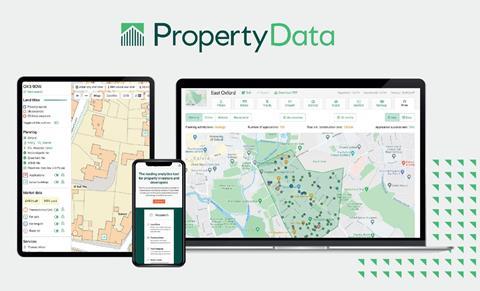Around 10 to 15 years ago, the only people in the residential property industry using data in a serious way were the big real estate investment trusts and the large investors. One of the main reasons was that data about the market and transactions was quite hard to come by.

Back then, the data was so fragmented and the only places you could get it were quite expensive. SME investors and developers all wanted data analytics for their investing decisions, but this would cost about £500 a month, so you had to at least be a 15-20-person company to consider spending that amount on data about the residential market.
Fast forward to five years ago, and the situation had got a little bit better. That was about the time we were thinking about launching our business, with the aim of creating something much cheaper in the sub-£100 a month bracket.
What Property Data does is showcase data and analytics for the residential market in the UK, focusing on providing access for smaller SME investors and developers. It’s a subscription website that helps investors and developers with the three phases of acquiring UK property.
The first phase is researching local markets and deciding where you’re going to invest your money.
The second is sourcing opportunities: that might be plots of land with or without planning permission; certain properties that are only available to cash buyers; properties that are unorganised and can be redeveloped; or anything in between.
We’ve provided a platform that covers everything from the “I’ve got some capital, I want to invest” stage, all the way through to completing a purchase to build residential property
The final phase we help people with is the evaluation and due diligence. So, once investors have a site in mind, we will help them look at its boundaries, building footprints, ownership, planning permission, flood risk and internet speeds. There are all sorts of things to consider before committing a lot of capital to a site.
We’ve provided a platform that covers everything from the “I’ve got some capital, I want to invest” stage, all the way through to completing a purchase to build residential property. We go to all these different sources to get data, clean it up and constantly refresh it, keeping it up to date and, crucially, providing the tools for people to draw insights from that data, so they can use it to help them make decisions.

The unique thing about this service is it’s targeted at smaller investors and developers. And what they are buying is not just data; they’re buying a monthly subscription access to a really great set of tools to look at data. It’s about the democratisation of access to data.
In terms of data sources, we pull in a lot of government data from the Land Registry about deals, data from Ordnance Survey about building footprints and roof heights, data from the Ministry of Housing Communities and Local Government about property internal areas, core housing supply data and council tax. Those are usually pretty authoritative sources of data, so the more of it we can get our hands on, the better.
Buying in data
We also scan the major property portals such as Rightmove or Zoopla. We won’t hesitate to buy and license data, even from commercial parties that we think will be useful for our users. A good example is planning. We’ve got a commercial partner that has a good data set on all the planning applications in the UK each week. All those datasets are way too expensive for an SME developer to acquire by themselves.
But it’s not just price, it’s the complications involved with handling the data. A dataset from Land Registry, for example, is 30 gigabytes; that’s absolutely enormous and to make matters more complicated, it’s arranged in a very particular, quite complex format, so even if you have the money, you might not necessarily have the technical skills to be able to make any use of it.
Having access to that data quite obviously helps investors and developers to make more money. It helps them to avoid expensive mistakes but also to identify a site they wouldn’t previously have identified.
There’s a wider societal benefit, too. We’re in a housing crisis, with not enough housing being built. So helping investors and developers to deploy capital more effectively and to deliver more units can’t be a bad thing at all. Yes, the big housebuilders help, but don’t forget that SME developers account for a massive amount of volume housebuilding. So, if customers use our platform, they get a return 10 times over, so £50 a month is not much to spend.
Of course, because we’re trying to create a low-cost product, our software can’t necessarily do all the things that the £500-a-month products out there can do – and it would be strange if it could. But the truth is, it can do the vast majority, perhaps 80% of what the pricey software does for a tiny fraction of the price.
We constantly listen to what our customers want and are always trying to innovate, see where the gaps are and close them. The biggest gap we see is access to planning data; a lot of the problem here is that when data is created and held by councils, it’s very fragmented – and there are 400 councils in the UK.
Pretty much everything we do covers England and Wales. It’s harder to gather data for Scotland – and even harder for Northern Ireland – because since devolution, some of the authorities that cover housing markets have been decentralised.
It is really important to make data analytics software simple and focused. Our customers can sometimes be quite demanding about getting more access to different datasets, but that’s because we almost make it look so easy.
We sometimes get asked if we will start covering the commercial market as well as residential. That is obviously a pretty big step and is something we could do in the future. But in the meantime, we are focused on refining our product and trying to be the leader in the residential property data market in the affordable bracket.

About PropertyData
Since 2017 PropertyData has been providing UK residential property investors and developers with the tools to make better decisions when buying UK residential property.





























No comments yet